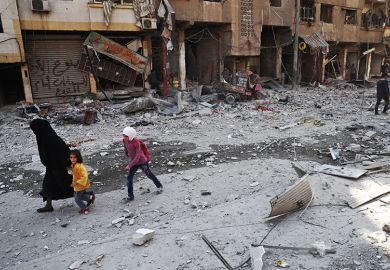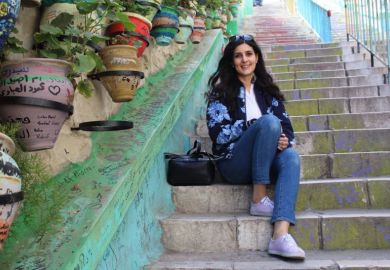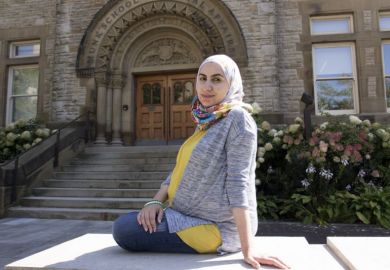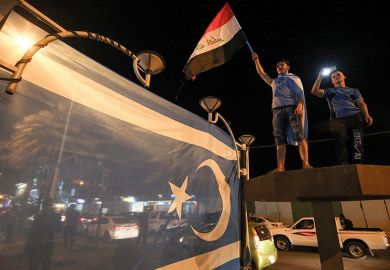As Syria’s civil war has dragged the country further into chaos, the flow of refugee academics and students has indicated that universities will have suffered serious – perhaps irreparable – damage.
But even as the government of Bashar al-Assad reasserts control over much of Syria, it remains hard to get reliable information on the state of the country’s higher education system after eight years of deadly conflict.
Two reports published this week shed significant light on the situation, demonstrating the devastating impact of tight state control, insecurity, intimidation and ravaged infrastructure.
The reports are products of a project, led by the Council for At-Risk Academics, the University of Cambridge’s Faculty of Education and the British Council, that was designed to develop the capacity of Syrian academics living in exile in Turkey to undertake qualitative research and to make recommendations for the future. After taking part in workshops in Istanbul covering qualitative interview training as well as “allied ethical issues”, 11 Syrian academics carried out digital interviews with 41 staff and 76 students still in Syria.
Even when fighting started in 2011, the researchers say in their first report, Syrian higher education was already in a very poor state, “a sector where attempts at reform had been thwarted and where market-driven expansion had focused on privatisation at the expense of quality. In this highly centralised system, the Ba’ath Party and national security apparatus had been embedded within a firm authoritarian and centralised university governance structure, with outmoded curricula and textbooks promoting regime ideologies.
“Corruption, favouritism and discrimination were extensive, and heightened inequality was evident and rising rapidly in respect of both investment and access to HE across different regions…Universities played little or no role in providing practical skills or training to support student transition into an already tight labour market.”
In almost all these areas, things have now got considerably worse.
Juliet Millican, an associate fellow at the University of Sussex’s Institute of Development Studies, worked on the final version of the second report, which focuses on the impact of the war, and produced a policy brief. On the central issue of the “heightened politicisation” of the sector, she pointed to “intense surveillance on campus”, meaning that “many academics are very careful about what they say”. There was “no freedom around the curriculum or research” because these were “predetermined for academics”. Even in areas not controlled by the Assad regime, “people are afraid of who might betray their confidences, so they stick to traditional teaching, not pushing the boundaries, very aware they may be being watched at any time”.
The report adds that “university appointments in regime-controlled HE sites since 2011 have been linked ever more closely to the regime in ways not seen before 2011, with some former security officials taking on leadership roles…there are signs that governance and decision-making form a unified process which involves a substantially heightened autocratic approach to HE governance alongside a purge of those leaders and scholars who have shown signs of dissent, followed by mass HE appointments of regime supporters to leadership positions”.
Syrian academics and students now living in camps in Jordan, the report says, have reported “mass violations of human rights through assassinations of academics and violent intimidation through both official and unofficial security figures and groups”. Those based at the University of Aleppo were “cut off from other cities, arrested at checkpoints and experienced high levels of intimidation, detention and harassment. Students were also forced to negotiate highly dangerous checkpoints manned by regime troops or [Islamic State] militants to move from eastern Aleppo to the west side of the city.” Furthermore, “increasing detentions, novel forms of patronage, unprecedented human displacement and murder of students and faculty” had all contributed to “climates of fear and distrust”.
The report also addressed the linked issues of “curriculum stagnation” and the sharp decline in both research and international partnerships.
“Former strong research partnerships [with Western universities] being built prior to 2011 have all disappeared,” explained Dr Millican, something hardly compensated for by increased contact with countries such as Russia, China and Iran. Syria’s “emerging research culture, though never strong, has disappeared almost entirely. And many archives and libraries have been lost.” Given that there was “no new research and development work”, this also meant that the “curriculum can’t change”.
Much of this, as the report makes clear, arises from the brute fact that universities in Syria were focused on “institutional survival”. One staff member told the researchers that they were “no longer capable of carrying out experiments” because materials had been “destroyed or were non-existent”. Research had elsewhere ground to a halt owing to “the lack of equipment and raw materials, as well as electricity, after 2011”.
On the final question of access and employability, the report is equally bleak. Students tended to choose universities on the basis of “safety and security considerations rather than the pursuit of quality”. Many had to deal with challenges such as “large class sizes, problems sitting exams or forced mobility to resit exams, diminished teaching, bombing during exams and teaching by poorly qualified individuals (including members of the security apparatus and students) due to the detention or forced exile of qualified academics”. With many programmes regarded as “poorly aligned with the labour market”, students regarded “the process of transitioning from HE to work unacceptable because of ‘red tape and dependency on government support’, as well as on favouritism, connections and security approvals”.
For the universities operating in areas no longer controlled by the regime, Dr Millican suggested, the lack of a Ministry of Higher Education and a system of accreditation meant that there was “no means of career development for researchers”. Because institutions “have no international recognition”, it was also difficult for students to gain degrees that “have currency outside their immediate context”.
The report incorporates some harrowing testimonies from 19 Syrian academics, who had taken refuge in Turkey and were interviewed by the Cambridge researchers.
One recalled life in a camp without heating, drinking water or toilet facilities. Another suffered from commuting between “liberated” and regime-controlled areas: “When I returned to my family home, the jihadists would say: ‘You belong to the regime and you are a spy’…And when I returned to my university…the regime army would say the same thing: ‘You are a spy for the jihadists.’ ” A third described persecution by Islamic State: “My older brother managed to escape, but his son is still held by them. My younger brother, who had a family of five children, was killed. Isis put him in one of their videos.”
In terms of what outsiders can do to help Syrian higher education, Dr Millican flagged up a number of areas. It was possible to begin “supporting individual institutions from a distance” through sharing curricula or offering guidance on ethics procedures, research protocols and the latest research, with a view to providing help on the ground if the security situation improves. Another option was to engage either with the Assad regime – although many academics had political objections to this – or the possible governments-in-waiting in areas now controlled by Turkish or Kurdish forces.
Much easier, as Dr Millican saw it, since “it doesn’t involve contact with the regime or sending people into the country”, was providing “support for academics in exile in the hope that they may eventually return home with a lot of the learning they have gained”.
Even those providing funds or otherwise responding to the humanitarian crisis in Syria, added Kate Robertson, Cara’s Middle East adviser, are “all too often guilty of not engaging with Syrian academics in exile to benefit from their local experience, knowledge, expertise and reach back into Syria. The same can be said of researchers working on issues relating to Syrian refugee communities or future challenges facing Syria.
“Cara is currently funding 21 discrete pieces of research in which Syrian academics lead with the support of UK academics in the role of mentors and principal investigators, which are not only ensuring continued academic engagement and contribution but are also supporting action-learning for a group with limited experience of international standards and good practice in research, given that the key role of academics in Syria was to teach.”
More specifically, Dr Millican is leading a project to build on the skills that exiled Syrian academics have gained from working on the research reports to examine “the contribution of different disciplines to reconstruction: energy security; food security; the maintenance of cultural heritage; education” as well as the specific role of higher education in social cohesion and peace building.
Although the Syrian higher education sector started from a low base and has declined dramatically, these academics are huge national assets who may eventually prove central in reconstruction efforts.
POSTSCRIPT:
Print headline: Syrian HE in pieces after years of war
Register to continue
Why register?
- Registration is free and only takes a moment
- Once registered, you can read 3 articles a month
- Sign up for our newsletter
Subscribe
Or subscribe for unlimited access to:
- Unlimited access to news, views, insights & reviews
- Digital editions
- Digital access to THE’s university and college rankings analysis
Already registered or a current subscriber?








